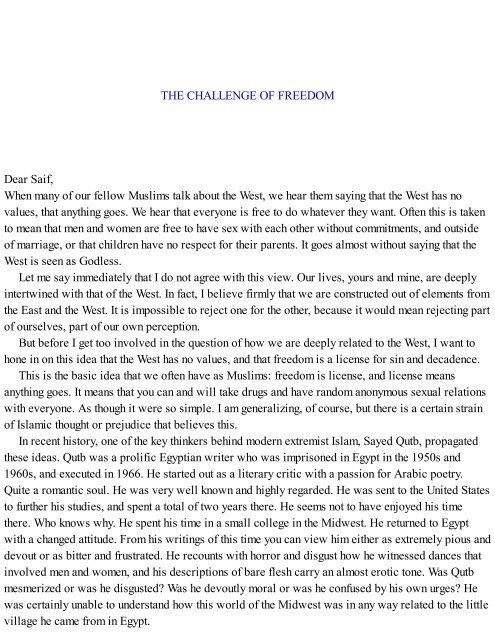1250119847
Create successful ePaper yourself
Turn your PDF publications into a flip-book with our unique Google optimized e-Paper software.
THE CHALLENGE OF FREEDOM<br />
Dear Saif,<br />
When many of our fellow Muslims talk about the West, we hear them saying that the West has no<br />
values, that anything goes. We hear that everyone is free to do whatever they want. Often this is taken<br />
to mean that men and women are free to have sex with each other without commitments, and outside<br />
of marriage, or that children have no respect for their parents. It goes almost without saying that the<br />
West is seen as Godless.<br />
Let me say immediately that I do not agree with this view. Our lives, yours and mine, are deeply<br />
intertwined with that of the West. In fact, I believe firmly that we are constructed out of elements from<br />
the East and the West. It is impossible to reject one for the other, because it would mean rejecting part<br />
of ourselves, part of our own perception.<br />
But before I get too involved in the question of how we are deeply related to the West, I want to<br />
hone in on this idea that the West has no values, and that freedom is a license for sin and decadence.<br />
This is the basic idea that we often have as Muslims: freedom is license, and license means<br />
anything goes. It means that you can and will take drugs and have random anonymous sexual relations<br />
with everyone. As though it were so simple. I am generalizing, of course, but there is a certain strain<br />
of Islamic thought or prejudice that believes this.<br />
In recent history, one of the key thinkers behind modern extremist Islam, Sayed Qutb, propagated<br />
these ideas. Qutb was a prolific Egyptian writer who was imprisoned in Egypt in the 1950s and<br />
1960s, and executed in 1966. He started out as a literary critic with a passion for Arabic poetry.<br />
Quite a romantic soul. He was very well known and highly regarded. He was sent to the United States<br />
to further his studies, and spent a total of two years there. He seems not to have enjoyed his time<br />
there. Who knows why. He spent his time in a small college in the Midwest. He returned to Egypt<br />
with a changed attitude. From his writings of this time you can view him either as extremely pious and<br />
devout or as bitter and frustrated. He recounts with horror and disgust how he witnessed dances that<br />
involved men and women, and his descriptions of bare flesh carry an almost erotic tone. Was Qutb<br />
mesmerized or was he disgusted? Was he devoutly moral or was he confused by his own urges? He<br />
was certainly unable to understand how this world of the Midwest was in any way related to the little<br />
village he came from in Egypt.
















